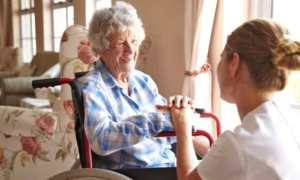
What is Elder Care?
Elder care is a broad term that refers to a range of services designed to meet the needs of aging adults. This includes everything from medical care to assistance with personal tasks like dressing, bathing, and eating. Elder care can be provided in various settings, including the senior’s home, an assisted living facility, or a nursing home, depending on the individual’s needs.
Key Types of Elder Care Services:
- Personal Care: Assistance with day-to-day activities such as bathing, grooming, dressing, and eating.
- Medical Care: Skilled nursing services, including medication administration, wound care, and chronic illness management.
- Memory Care: Specialized support for individuals with Alzheimer’s or other forms of dementia.
- Physical Therapy and Rehabilitation: Therapeutic exercises to maintain or improve mobility, strength, and function.
- Palliative and Hospice Care: Comfort-focused care for those with serious, life-limiting conditions, aimed at pain management and quality of life.
Benefits of Elder Care
Elder care addresses both physical and emotional needs, offering essential support for seniors who require assistance beyond companionship. The benefits of elder care can include improved quality of life, increased independence, and greater peace of mind for family members. Here are some specific benefits:
- Comprehensive Care for Chronic Conditions
- Elder care services often involve specialized healthcare professionals who can manage chronic conditions such as diabetes, heart disease, and arthritis. With routine monitoring and medication management, seniors experience fewer complications and improved health outcomes.
- Increased Independence and Comfort
- Elder care services are often delivered in the senior’s home, allowing them to live in a familiar environment surrounded by personal belongings. This setup promotes a greater sense of independence and comfort, especially compared to institutional settings.
- Support for Cognitive Health
- Memory care and cognitive support are critical for seniors facing dementia or Alzheimer’s. Elder care provides structured routines and therapeutic activities that help preserve cognitive functions, improving the quality of life for both the senior and their families.
- Improved Safety
- Elder care services often include fall prevention, mobility assistance, and other safety-focused practices that minimize the risk of accidents. For seniors living alone, this can be particularly important, as falls are a common cause of injury among the elderly.
- Family Peace of Mind
- Knowing that a trained professional is providing care can alleviate the stress and worry for family members, who may not have the time or expertise to offer the level of support their loved one needs.

What is Companion Care?
Companion care focuses primarily on providing social interaction and light assistance with household tasks for seniors who may not need intensive medical or personal care. Companion caregivers offer emotional support, engage seniors in activities they enjoy, and may help with tasks like meal preparation, errands, and light housekeeping.
Common Companion Care Services:
- Social Engagement: Companions engage in conversation, games, and other activities that stimulate mental well-being.
- Meal Preparation and Light Housekeeping: Companion caregivers may prepare meals, perform light cleaning, and organize the home.
- Transportation: Accompanying seniors to appointments, errands, and social events to maintain an active lifestyle.
- Medication Reminders: Though they don’t administer medication, companions can remind seniors to take their medication on time.
Benefits of Companion Care
While companion care may not provide the medical support in elder care, it offers seniors significant social and emotional benefits. Here’s how companion care can make a difference:
- Reduced Loneliness and Social Isolation
- Companionship can be transformative for seniors who live alone or far from family. Regular social interaction reduces feelings of loneliness, enhances mental well-being, and may even lower the risk of depression and cognitive decline.
- Encourages a Sense of Purpose
- Companions engage seniors in activities, outings, and hobbies that give them something to look forward to. Staying active and involved provides a sense of purpose and improves emotional health.
- Maintains Routine and Structure
- Having a companion can help seniors maintain a structured daily routine, which is especially beneficial for those with mild cognitive impairments. Routines support mental health and promote independence in daily activities.
- Support for Daily Tasks
- Although companion care doesn’t typically involve personal or medical care, the assistance with household tasks like meal prep and light cleaning helps seniors manage their daily lives more comfortably.
- Flexibility and Affordability
- Companion care is often more affordable than elder care and can be scheduled flexibly, making it an accessible option for seniors who don’t require full-time assistance.

Choosing Between Elder Care and Companion Care
Deciding which type of care is best for your loved one depends on their specific needs, health status, and level of independence. Here are some guidelines for choosing the right type of care:
- Elder Care is ideal if:
- Your loved one needs help with activities of daily living (dressing, bathing, grooming).
- They have a chronic illness or require medication management.
- There is a need for physical therapy or memory care.
- They are at risk of falls or other accidents and need regular monitoring.
- Companion Care is suitable if:
- Your loved one primarily needs social interaction and emotional support.
- They need some help with light housekeeping, meal prep, or errands.
- They don’t require medical care or assistance with personal hygiene.
- They are relatively independent but benefit from regular check-ins.
Finding the Right Care Provider
Once you’ve decided on the type of care, finding a trustworthy provider is the next step. Here are tips for choosing the right care provider:
- Research and Recommendations
- Start with recommendations from family, friends, or healthcare professionals. Online reviews and ratings can also give insight into the provider’s quality and reputation.
- Conduct Interviews
- Arrange interviews with potential caregivers to assess their skills, personality, and compatibility with your loved one. This will help you find a caregiver who aligns with your family’s values and expectations.
- Check Credentials and Backgrounds
- Ensure that the caregiver or agency conducts background checks, has appropriate certifications, and is experienced in the level of care needed. This step is especially important for elder care, where medical expertise may be necessary.
- Request a Trial Period
- A trial period allows you to evaluate the caregiver’s compatibility and effectiveness without a long-term commitment. This is a great way to assess the fit between the caregiver and your loved one.
- Monitor and Communicate
- Once care is in place, stay involved by checking in with both the caregiver and your loved one regularly. Open communication allows you to make adjustments to the care plan as needed and ensures your loved one is receiving quality support.

Elder care and companion care both play essential roles in supporting seniors and enhancing their quality of life. While elder care addresses physical and medical needs, companion care fulfils the equally important social and emotional aspects of well-being. Whether your loved one needs comprehensive support or just a friendly face to talk to, there are services available to provide the assistance they need to stay safe, comfortable, and happy.
By understanding the differences between elder care and companion care, and knowing how to find the right provider, families can make informed decisions that provide peace of mind and improve their loved one’s quality of life.
With Kizuna, you can find reliable elder care and companion care options that truly fit your loved one’s lifestyle and needs.
Here’s how –
👉🏻 Find 24 hour in home care for elderly on Kizuna
FAQs:
How do I know if in-home care is the right choice for my loved one?
Private nursing care at home is ideal for seniors who want to remain in their own homes but need assistance with daily activities, medical tasks, or personal care. It’s especially beneficial for elderly individuals who prefer a familiar environment, as it reduces the stress of relocation and allows for more personalized care. If your loved one values independence but could benefit from extra help, in-home care may be a good fit.
What types of services are included in eldercare at home?
Eldercare services provided at home can range from basic assistance to advanced medical care. Services typically include help with daily living tasks like bathing, dressing, meal preparation, medication management, and even specialized care for conditions like dementia. In-home eldercare also covers companionship and emotional support, ensuring a more holistic approach to senior well-being.
How do I ensure the safety of my loved one with in-home eldercare?
Safety is essential in eldercare. When hiring in-home caregivers, prioritize those with background verifications and trusted recommendations. Platforms like Kizuna offer background-checked caregivers, providing families with peace of mind. Additionally, monitoring the caregiver’s activities, conducting regular check-ins, and creating a safe home environment can further enhance safety for your loved one.
How can Kizuna help in find private nursing care in home for my family member?
Kizuna is a caregiver marketplace that connects families with verified, experienced caregivers specializing in eldercare. Each caregiver undergoes a comprehensive background check, and Kizuna’s platform offers transparent profiles and reviews, helping families find a suitable match. With dedicated care coordinators, Kizuna also supports families every step of the way, ensuring quality, compassionate in-home care tailored to each family’s needs.
Is in-home eldercare affordable, and what are the payment options?
The cost of in-home eldercare varies based on the level of care needed and caregiver qualifications. In-home care is typically paid out-of-pocket, but some insurance plans and government programs may cover specific services.
Kizuna offers transparent pricing so families can understand costs upfront and avoid unexpected expenses.
How can I find elder care near me in the North Bay Area?
You can find caregivers in the North Bay Area by using online platforms that specialize in caregiving services. Look for local directories, community resources, or dedicated marketplaces like Kizuna, where you can filter searches by location and find caregivers with relevant experience and qualifications.
Are elder care/ private nursing care in homes near me in Marin County and Sonoma County trained and certified?
Yes, many caregivers in Marin County are trained and certified in personal care and elder support. It’s important to verify their credentials and experience to ensure they can provide the level of care your loved one needs.
Can I get elder care/private nursing care in a home near me for short-term care in Marin County and Sonoma County?
Yes, many caregivers in Sonoma County offer flexible arrangements, including short-term care. Whether you need temporary assistance or a caregiver for a few hours a week, you can find options that suit your needs through local services or platforms like Kizuna.
More resources on elder care:
👉🏻Where to Get the Best In-Home Care Services in San Francisco
👉🏻Finding 24-hour In-Home Care for the Elderly on Kizuna
👉🏻How to Find Private Nursing Care In Home: Sonoma & Marin County



